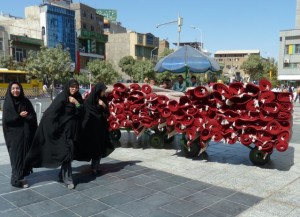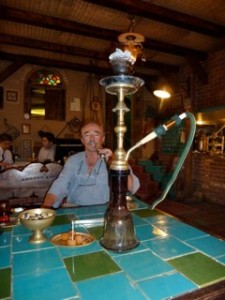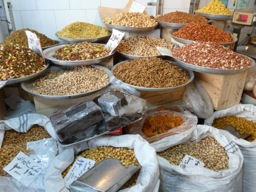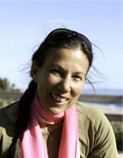Now, as for that quylan, otherwise known as a narghile. Or for children of the 60s, perhaps waterpipe or hookah will ring a bell. We were in Tehran, eager for something to eat after a long, tiring day’s drive on the fabulous but admittedly monotonous superhighway from Tabriz. Wonderful, soulful music emanated from our hotel’s old-style tearoom, so we went in there.
What we found was a darkish room, wood tables with blue and green tiled tops. Banquets lined with stiff cushions and stiffer bolsters, all covered in a prickly carpet-type fabric. Three men played traditional instruments, singing ballads with much gesturing of hands and wagging of heads. It seemed just the place.
As soon as we sat down, two small glasses of tea were brought over, with a plate of small deep gold pastries, each no bigger than a thimble. I bit into one and a burst of sweetness filled my mouth. Looking around I realized something was missing from our table. Every other table was wreathed in a cloud of pale smoke from a quylan. So I asked for one, too. “Orange, mint, lemon, apple?” asked the waiter. Since I had no idea what I’d be smoking, I said mint, which is good with everything.
A short while later a tall maroon glass waterpipe topped with a tiny brazier holding 3 coals, was brought to our table. The waiter unwound the long red hose that coiled like a snake around the brass pipe leading from the brazier to the water receptacle at the base. He left us with two plastic-wrapped sanitary nozzles. Never having done this before, and not wanting to look utterly foolish, I stuck one of the nozzles in the wood end of the hose and sucked. Nothing. Bernard tried. Nothing. What to do? I tried again. Nothing.
Everyone else seemed to be getting reams of smoke out of their quylans, and, since we were obviously foreigners, their smoke-filled eyes were all solely starting to turn toward us. I felt distinctly observed. There was nothing for it but to call the waiter back over. He did his own sucking thing, (using my plastic nozzle, now unfortunately no longer sanitary) and exhaled clouds of smoke. Somehow that got it going and we were able to puff quite satisfactorily on our water pipe for quite some time.
I must say that I took to it more readily than Bernard, puffing happily until I mentioned to him that I was getting light headed. No idea why. I very much enjoyed the whole ritual, especially the cool, mildly mint flavor, interspersed with sips of strong, sugary tea and handfuls of the nuts and raisins they brought to the table. I have no clue what I was smoking.
That evening we went back for a second go-round, this time prefaced with a superb lamb soup stew called Dizi Sangzi. Picture a heavy black tubular clay pot filled with a slow-cooked mix of succulent lamb, carrots, potatoes, beans and chickpeas. A heavy flat-bottomed wood mortar accompanies it, and you use that to mash everything into a savory puree. A plate holds slabs of flat bread, nicely charred on a grill, which you tear into bits to scoop up the mash. Small bowls of pickled beets and cabbage, spicy tomato cucumber relish, mashed eggplants and a dollop of salty sour cream add some tang to the mix. Wow! More singing was going on, mournful and poignant, with a hammer dulcimer and a stringed gourd being plucked as accompaniment. I followed that tasty feast with another narghile, this time flavored with orange.
As we drive, we munch on giant pistachios roasted in vinegar and salt. Iran is famous for its pistachios and they’re much easier to come by than caviar. We also have accumulated a stash of perfumed dates, sun dried Turkish apricots and giant almonds.
Now we’re in Mashhad, Iran’s holiest city and the final resting place of Imam Reza, 8th Shiite Imam and direct descendant of the Prophet Mohammed. Tomorrow we finally have a rest day, much needed after driving already 4,000 kilometers.

Day after tomorrow we enter Turkmenistan. I can say without question that being in Iran has transformed my thinking about the country. This is what I was hoping for when we crossed the border. It’s wonderful to be here and a privilege to have images and memories of warm encounters with Iranians. And I’ve learned how to write numbers in Farsi, which I ‘m sure will stand me in good stead some time in the future.
-Dina













